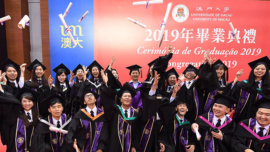Local authorities have finalised the final report on the public consultation held for the city’s first Trade Union Law, with many opinions opposing the limitations proposed on the right to hold strikes, the type of trade union associations that will be allowed, and the employment sectors covered.
The public consultation on the Trade Union Law took place for a period of 45 days, between October 31 and December 14, 2021.
During the consultation period, four clarification sessions were organized and opinions were collected from employers, workers, the public, associations and academic organizations.
In addition, opinions and suggestions from different sectors of society were widely collected through the thematic page, post office, email, fax and telephone with recorded messages, among other means.
According to a statement from the authorities, 2,653 sets of opinions were received, totalling 24,537 opinions and suggestions.
About 55.3 per cent of all opinions were submitted by individuals, with 42 per cent by associations and only 2.3 per cent by companies
The Legislative Assembly had, prior to this government-led proposal rejected more than 10 trade union bills presented by legislators over the past few years.
During the consultation process, these limitations raised some concerns from labour associations and labour-linked legislators. Some of these opposing opinions were also reflected during the public consultation.
One of the issues that raised opposition was the absence of the right to organise strikes by trade unions, although not much information was provided on this matter in the public consultation report.

According to the report, some opinions submitted pointed out that the omission of the right to strike leads to a “reduction in the rights and powers that must be conferred on trade union associations” which should be guaranteed in the Macau SAR Basic Law.
In the report, authorities respond that although the trad union law enshrines the right to organise strikes for local residents since the law is “completely new” it is necessary to gradually inform all involved parties, employers and workers and “gradually and orderly” advance trade union legislation.
The proposed union bill includes limitations for professional sectors linked to the exercise of sovereign functions, including civil servants and other professions related to public services such as healthcare, transportation, and public utilities.
A large percentage of the opinions submitted concerning the scope of the law requested for some of these four groups to be allowed to enjoy the right for organising trade unions.
However, in a response included in the report, authorities stated that the reason that since the services provided by those workers involve “social order” as well as public interests such as health and services in response to the basic needs of the population, it was necessary to ensure that these services “maintain continuous operations”.
About 28 per cent of all opinions concerning the scope of the trade union law requested for non-resident workers to also enjoy the right to organise union associations, something not allowed under the draft bill.
Concerning this matter, the Macau government only noted that it “will consider the concrete situation of the city and prudently carry out an analysis and study of these opinions”.
“Furthermore, there were also opinions that focused on the exemption from the application of that Law to workers from other specific sectors or the need to create adequate regulations for them, such as workers from gambling concessionaires, the tourism sector, teaching, among others,” the report noted.
Almost 97.5 per cent of the opinions submitted were also against allowing only three types of trade unions to be established, namely sector union associations, professional union associations and trade union associations for companies.
According to the proposal, this limitation was established since “workers’ associations are made up of workers who work in the same sector or with the same profession” while only a few of them are made up of workers from the same company or from the same entity.
The report states that some people opposed the established association types since they could “include the possibility of overlapping members”, which could make the associations’ functioning “more complicated and not be favourable to collective bargaining between companies and associations.
These opinions suggested that the purpose of the association and the qualifications of the members should be considered, and the association should not be defined by a type restricted by law.

Some even considered that by defining trade associations into three types, an employer will have to face when at the same time several trade union associations or types of associations, which may “cause an imbalance”.
Most opinions – some 96 per cent of the total – were also against a proposal that only in companies with a certain number of workers, would employees be allowed to constitute trade unions, a measure that would exclude several SMEs from trade union rights.
However, most also did not agree with the establishment of specific regulations for small and medium-sized enterprises as they already disagreed with the need for the need to create a specific “company trade union association” instead of a uniform collective bargaining mechanism.
“Others pointed out that there is currently no social consensus or legal provision in
regarding the definition of small and medium-sized enterprises, nor is there any specific regulation in other countries or regions on collective bargaining by small and medium-sized enterprises,” the report noted.
Authorities stated in the report that they will “fully and carefully” consider the
opinions regarding the types of trade union associations presented during the consultation period in order to create the respective regulations.
The bill also does not allow for strikes to be called by unions while any given labour group would need to represent at least 50 per cent of the workers in a company before the labour group could be recognised for bargaining purposes.
In addition, only one labour group would be officially recognised per company and any agreement reached between a labour union and a respective employer resulting from a collective negotiation process should be automatically extended to the non-union members employed by the same company.
Almost 88 per cent of the opinions collected opposed the need to define a proportion for collective bargaining, arguing that this could affect the performance of the trade union association’s role as a platform and harm the development of harmonious labour relations.
More than half of the people who submitted opinions also opposed that the collective negotiation process should be automatically extended to the non-union members employed by the same company, many without explaining why but with some saying that this could go “against the will of these workers and result in injustices”.
Some residents also warned that currently, several workers’ associations already exist ” some of which have more than half a century of history” and that “play a positive role in the establishment of harmonious labour relations” and expected these associations could transition to trade unions under the new law.
To this, the report responds that authorities that transitional provisions in conjunction with the current situation of existing workers’ associations will be allowed so that those who wish to register as a trade union can do so.
“In conjunction with the guidelines presented in the consultation document and the opinions and suggestions received during the consultation period, the Government will, depending on the real situation of the MSAR, seek a way to create a legal system of the Trade Union Law suited to the needs of Macau’s development,” authorities noted.
On the other hand, some 98.7 per cent of the opinions agreed that the membership and participation of local unions in the activities of international organizations should be monitored.
A similar percentage also defended an inspection of the obtaining and use of funding for future trade unions in Macau, with some warning of the risk of the influence of “external forces” for the practice of acts that could “harm the harmony and stability of Macau society”.
In response, the Macau government promised to create an inspection mechanism to prevent unions from joining “international organizations that are against their purpose” and to “ensure the legality” of funding these organizations.





















